Aggravated Battery
As outlined in O.C.G.A. § 16-5-24, aggravated battery involves intentionally and maliciously causing serious bodily harm to another. Classified as a felony under Georgia law, this is a serious criminal charge that carries severe penalties and legal ramifications. In the following, you’ll learn more about what constitutes aggravated battery and what those facing these charges can expect.
What is an Aggravated Battery?
The exact wording of the law makes clear that aggravated battery represents a particularly brutal form of battery, stating, “A person commits the offense of aggravated battery when he or she maliciously causes bodily harm to another by depriving him or her of a member of his or her body, by rendering a member of his or her body useless, or by seriously disfiguring his or her body or a member thereof.”
This sets it apart from simple battery, which is the act of causing physical harm, such as by hitting or striking someone, but not necessarily causing physical injury. Serious injury, something that leaves the victim unable to lead a normal life due to disfigurement, permanent disability, or dismemberment, elevates a simple battery charge to an aggravated battery charge.
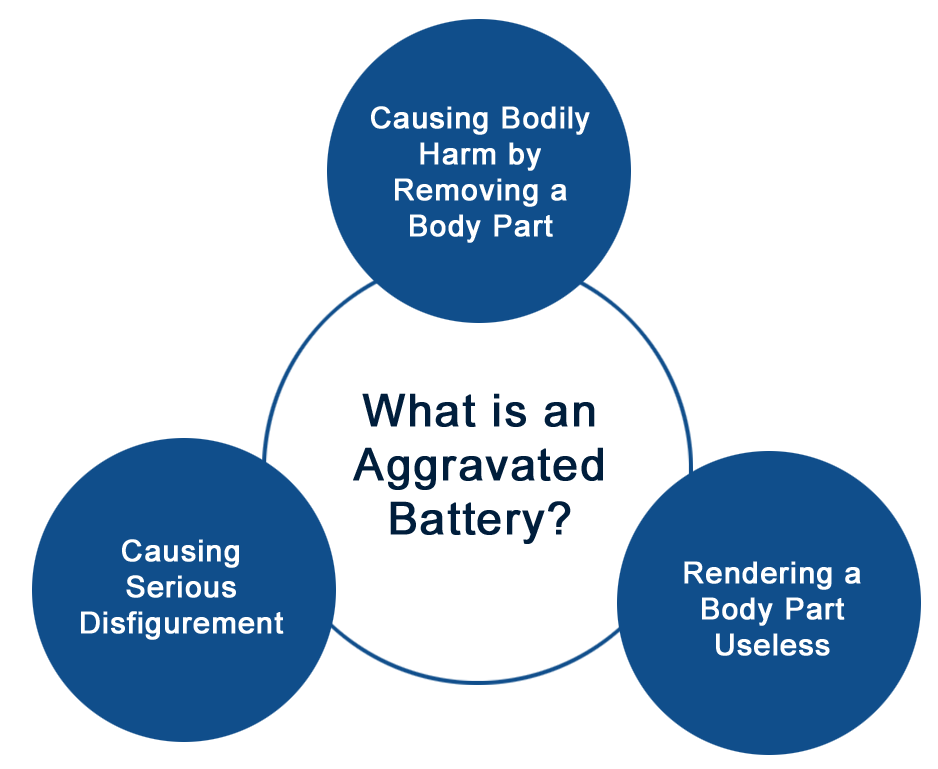
Understanding the Differences Between Battery and Aggravated Battery: Key Elements and Consequences
Picture a fight breaking out between two drunk spectators at a sporting event. Someone tries to break it up, but in the fracas they are elbowed in the face, causing a black eye. The person who hit them could be charged with battery, which is considered a misdemeanor unless the victim is a child, a public officer, or pregnant.
But if that incidental elbow to the face was intentional, and was issued with enough force to permanently disfigure the victim, that could be considered aggravated battery. The attacker could be charged with a felony, leading to imprisonment and life-long implications from having a felony on their criminal record. The difference lies in the permanence of the injury.
This outlines the two key elements of aggravated battery. This first is intent, that the assailant acted with malice, either intentionally or recklessly, to cause serious harm. The second is that the attack must result in serious bodily harm. More than a simple bruise or cut, this could be a permanent disfigurement such as a scar, loss of a body part, or permanent damage such as paralysis or brain injury.
Penalties for Aggravated Battery
As Georgia law qualifies aggravated battery as a felony, it describes severe penalties and punishments for those convicted. This includes a prison sentence of 1-20 years; monetary punishment in the form of fines and restitution payments; and the permanent blight of a felony conviction on their criminal record, making it difficult to secure employment and leading to loss of voting and second amendment rights. Those convicted may also be required to attend anger management classes or counseling, perform community service, or serve probation.
The exact set of consequences will be determined based on the specifics of the case and any aggravating factors, such as the use of a weapon, cases of domestic abuse, or incidents in which the victim is elderly, a child or an officer of the law. This latter factor, in which the nature of the victim is considered, carries its own set of enhanced penalties.
For example, if the victim is a public safety officer, the mandatory minimum prison sentence of three years without probation, with imprisonment generally from 10-20 years. If the aggravated battery occurs between family members, the prison sentence will be between 3-20 years. If the victim is a senior citizen 65 and up, a public school employee, or was riding public transit at the time of the incident, the prison sentence will be between 5-20 years.
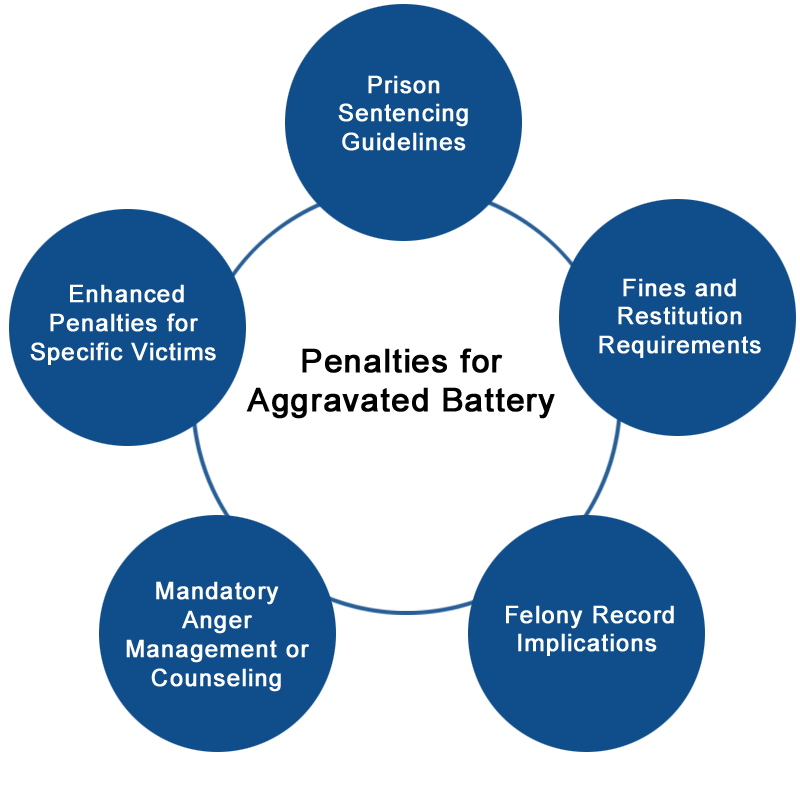
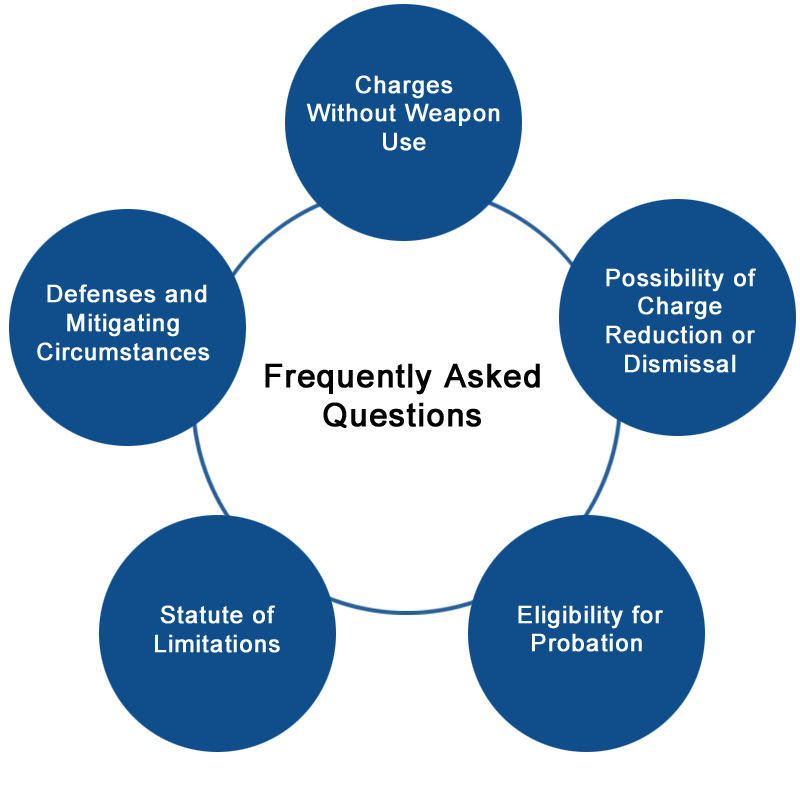
Frequently Asked Questions
Can I Be Charged with Aggravated Battery if I Didn’t Use a Weapon?
Yes. The legal definition of aggravated battery focuses more on the severity of the injuries caused by the attack, rather than how they were inflicted.
Is It Possible to Have Aggravated Battery Charges Reduced or Dismissed?
With the right defense, yes. This would require providing exculpatory evidence, showing lack of intent or explaining mitigating circumstances that may have led to the injury.
Is It Possible To Seek Probation for an Aggravated Battery Conviction?
Possibly, but because the state of Georgia considers aggravated battery such a serious crime, it is not always an option. But depending on the circumstances, it could be possible for those with a clean criminal record.
What is the Statute of Limitations for Aggravated Battery?
Generally, four years from the date of the initial incident. Exceptions can be made to that rule, however, based on specific circumstances.
Frequently Asked Questions Continued
What Are the Long-Term Consequences of a Felony Conviction?
Beyond the financial strain of fines and restitution, and the loss of freedom during a prison sentence, a felony conviction causes immense long-term hardship. Convicted felons may lose their right to vote, adopt a child, or serve on a jury, and may lose their second amendment rights. A felony on their record can several limit their job prospects, access to public assistance, or ability to secure professional licensing. They may also pay higher insurance premiums. That’s in addition to the personal and social stigma that usually comes with being a convicted felon.
Are There Any Options for Alternative Sentencing?
In certain cases, yes. Georgia’s First Offender Act gives first-time offenders a chance to plead guilty, complete their sentence of jail or probation, and then potentially have the case dismissed upon being discharged. This leaves them with no felony conviction on their record, helping them maintain their civil rights.
What Are Some Possible Legal Defenses Against Aggravated Battery Charges?
At Zeliff | Watson, we’ve successfully argued countless cases of aggravated battery, using a variety of methods to build a defense strategy. We’ve shown juries how the defendant acted in self-defense, or didn’t intend to harm the plaintiff. We’ve proven cases of mistaken identity, where the defendant was shown to not be the perpetrator. And time and time again, we’ve challenged the prosecution’s evidence to the point that it was deemed insufficient.
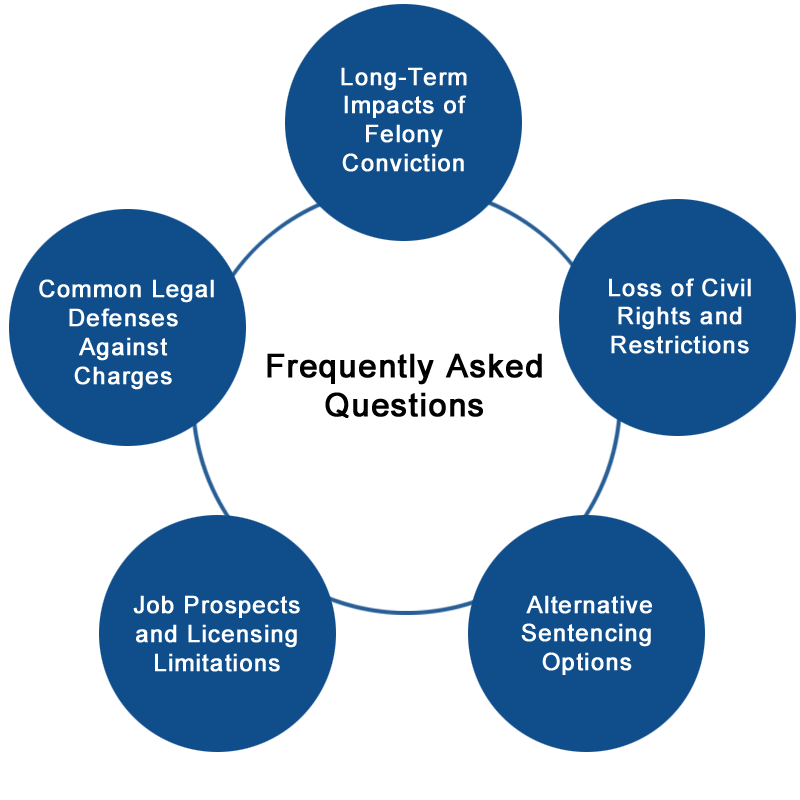
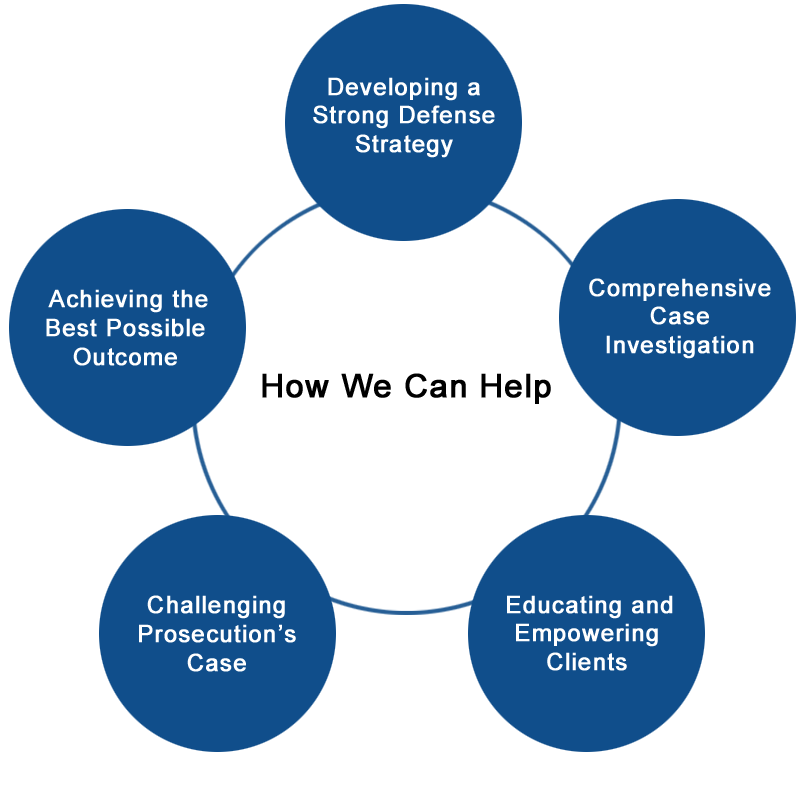
How We Can Help
The Zeliff | Watson approach rests on the three foundational pillars of our practice: Protection, Empowerment and Achieving the Best Possible Outcome. We protect you by creating a robust defense strategy on a foundation of meticulous research. As soon as you hire us, we launch into an exhaustive investigation of your case, unearthing evidence to exonerate you that is more compelling than anything the prosecution can produce. Informed by this thorough knowledge, we can expose every flaw in the case against you and challenge every allegation.
We empower you to be a part of this defense, educating you on the law and the process, and helping you understand the strategies we employ. We give you the information you need to stand on equal footing as the prosecution, letting you join us in the fight to restore your freedom and dignity.
This is how we achieve the best possible outcome. Because it’s about more than just mitigating the legal consequences you may face. It’s about restoring your ability to control your own destiny, giving you peace of mind while facing these serious charges.
Schedule a free, no-obligation case evaluation to give our experienced legal team the opportunity to discuss the details of your case, explore the options before us, and answer any questions you may have. If nothing else, you will walk away from the meeting more confident that you can face the challenges that lie ahead and sleep better tonight knowing you are protected.
A Simple Process to Getting Started

Schedule a Free Case Evaluation
Schedule a free, no-obligation, and confidential case consultation in person, online, or over the phone. This will help you understand how your case can be challenged, potentially leading to a reduction, dismissal, or acquittal of your charges. Click here to schedule your case evaluation.

Meet Our Defense Team and Conduct a Case Evaluation
During your free case evaluation, you’ll have the opportunity to ask questions, receive answers and legal guidance, and collaborate with our attorneys to better understand your side of the story, gather evidence, and devise a strategy to achieve the best possible outcome for your pending criminal charges.

Start Defending Your Case
After your free case evaluation, Zeliff & Watson will assist in preserving evidence and safeguarding your rights, ensuring your protection throughout the process. The defense team will also provide a proposed fee to represent your case, with the goal of achieving the best possible outcome.

